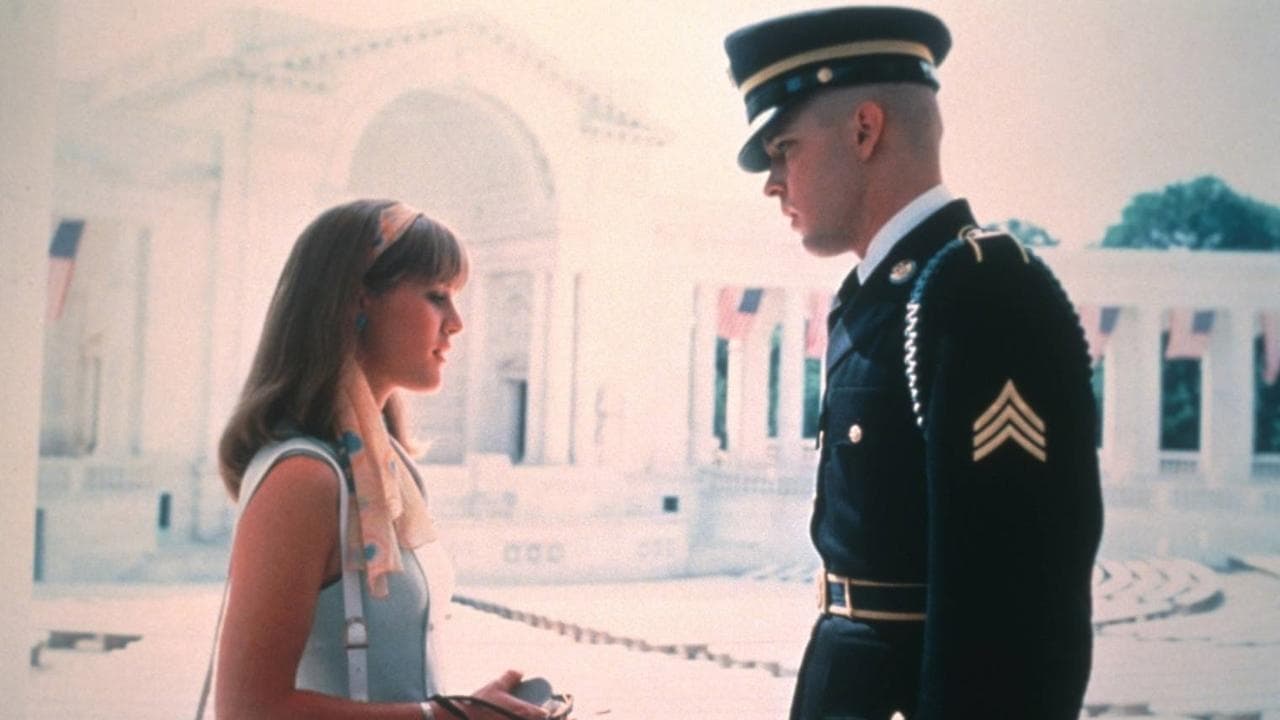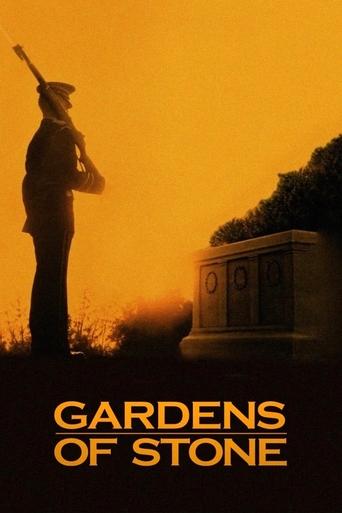

This is a very underrated movie and belongs up there with some of Francis Ford Coppola's best movies. The movie has a great cast that includes James Caan, Anjelica Huston, James Earl Jones, Dean Stockwell and several more people. Caan plays a solider who fought in Korea and Vietnam but is now in charge of Arlington national Cemetery and wants to train young soldiers going into Vietnam but is turned down. Huston is Caan's girlfriend and Jones is his friend who fought with him in Vietnam and now serves with him. Stockwell is the man in charge and D.B. Sweeney is a young soldier who can't wait to get to Vietnam. It's a really great movie that is one of Coppola's best films.
... View MoreStrangely quiet, gentle movie considering the subject matter. Not much action, but quite a bit of discussion of the ramifications and consequences of war.Portrays the contrasts between p*ss-and-vinegar young soldiers, and the old-hand leadership of Sergeant Hazard and the Sergeant Major.The death of Jackie Willow is stunning, and the scenes afterward are sensitively done, and very sad. There is much to consider in the prices we all pay for being so ready to get into combat. Sergeant Hazard understands the costs, and wants to get back into the action, if only to ensure no more young men enthusiastically stumble into death.Very well done, and very well acted.
... View MoreIt's strange how Hollywood still feels the constant need to pursue its glorification of the military when every other nation's film industry has pretty much moved on from the war film genre. Of course, America is a nation that has been engaged in more conflicts than most other nations in the past half-century and, while that isn't intended as a criticism, it does perhaps provide the key to America's seemingly endless fascination with the arena of war in all its guises.Coppola's return to the theme of the Vietnam war is as different from its predecessor as any two films with the same backdrop can be. The story of Gardens of Stone takes place in America, amongst the soldiers detailed to bury the bodies that are shipped back to Arlington National Cemetery from the scene of the conflict with monotonous and terrifying regularity. It is a relatively meditative and introspective study, weakened by a thinly drawn pivotal character (Jackie Willow, played by D. B. Sweeney) who is incredibly one-dimensional for a film that is attempting to offer an insight into the mentality of the soldier away from the battlefield at a time of war. James Caan, in his first movie role for five years, makes good use of a much stronger role as Sgt. Clell Hazard, the experienced soldier frustrated by the impotence of his position, who believes he should be fighting in the field or at least training youngsters on how to stay alive out there instead of burying them when they come back. Both he and James Earl Jones in another good part, display a healthily jaundiced view of the war. Angelica Huston also has an important (if slightly ineffectual) role as the individual caught in the middle who opposes the war but understands Hazard's reasons for wanting to fight. Jordan Cronenweth's camera-work is worthy of praise here, softening Huston's angular features and making it possible for her to convincingly play a gentler and softer character than she normally does. All other characters are strictly genre stereotypes.Unfortunately, any good work by the principle members of the cast is spoiled by a weak and unconvincing storyline that fails to involve the viewer the 'tragic' ending is particularly unmoving, although it may have a greater impact on American audiences whose families were more closely involved with the conflict. At a time when Vietnam films were all the rage, Coppola is to be applauded for choosing a different but no less relevant perspective, but any message he may have wished to deliver is hopelessly weakened by a mediocre script and uninvolving storyline.
... View MoreI saw this movie on video, soon after its original release, while attending college on a NROTC scholarship. It is a fine work, with a unique perspective on the Vietnam War. It was especially poignant, as I was preparing for military service during the Reagan/Bush years. This was not a film about the soldiers in the rice paddies; or protesters in Washington. This is the story of the men who had to bury the dead and honor their memories. These were soldiers who might be going to Vietnam, and those who had come back from there. It's about the senseless loss of life that war brings and the hubris of youth.Spoilers-James Caan gives an outstanding performance. He has seen Vietnam and would rather be over there or in a training position, where he feels he could help bring some of these boys back alive, rather than burying them. He is torn up by the knowledge that he can't help. He meets and falls in love with Anjelica Huston, a reporter who opposes the war, but is attracted to Caan. Caan tries to make her see his point, that he doesn't love the war, but has the knowledge hat could save some of the men who have to fight it.DB Sweeny has some fine moments as the young soldier who is itching to be in the middle of the war. He is the face of so many who did their duty and paid a horrible price.There are many fine performances in this film, but it doesn't always come together. Still, it is greater than its faults.I didn't notice this in the goofs; but, in the original video release, you could clearly see the boom mic in frame during the restaurant conversation between Sweeny and his girl. My friends and I used to laugh hysterically during this scene, as the mic would swivel between actors as they said their lines. When I later bought a copy, the mic was missing. I assume it was erased when it was remastered for laser and dvd.
... View More